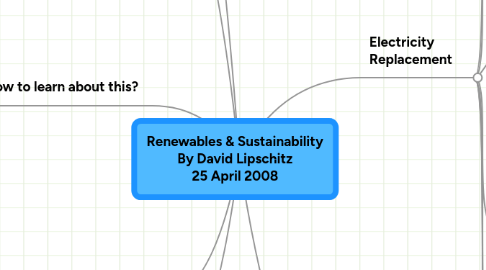
1. Recycling
1.1. Glass
1.2. Plastic
1.3. Dump Management
1.4. Ground Water Problems
1.5. Grey Water
1.6. Food Waste
1.6.1. Use Methane
1.6.2. Worm Farms instead of composting
2. Building Techniques
2.1. Geodesic Dome
2.2. Using LED lights
2.3. Gas for cooking as backup
2.4. Gas for lighting as backup
3. How to learn about this?
3.1. Reading
3.1.1. Build your own PV solar panel $13 www.goodideacreative.com/solarpanel.html
3.2. Doing
3.2.1. discoversolarenergy.com/DIY/pv-panels.htm
3.3. Models
3.3.1. DiscoverThis.com experiments
3.3.1.1. Power House $130
3.3.1.2. Electric Motor Kit $10
3.3.1.3. 500 Electronic Projects $250
3.3.1.4. Solar Energy Kit $10
3.3.1.5. Physics Solar Workshop $57
3.3.1.6. Physics Workshop $49
3.3.2. ThamesAndKosmos.com
3.3.2.1. Wind Power Kit available May 2008
3.4. Weather Station
3.4.1. Wind direction and speed
3.4.2. Days and rate wind is blowing
3.4.3. Rain
4. History
4.1. Windmills
4.1.1. Is using renewables really new?
4.2. Energy Storage
4.2.1. e.g.: bow and arrow energy
4.2.2. pumped water systems
4.2.2.1. Versailles 1666!
4.2.2.1.1. These fountains ran without electricity
5. Cost
5.1. How expensive is it?
5.2. Is it truly expensive?
5.3. Should we change our thinking?
5.3.1. Is it more expensive to buy a new car or to invest in renewables?
5.4. The Nuclear Debate
5.5. kwh cost vs zero cost because of capital increase of the installation (house)
6. Electricity Replacement
6.1. Solar
6.1.1. Hot Water Solar Water Heating
6.1.1.1. SWH
6.1.1.1.1. Flat Panel
6.1.1.1.2. Vacuum Tubes
6.1.1.1.3. Check Geyser 98% efficient
6.1.1.2. Black bags - Cape Union Mart
6.1.1.3. Old 1.5 or 2 litre plastic bottles
6.1.2. Electricity
6.1.2.1. Photo-voltaics
6.1.2.1.1. converts sunlight into electricity
6.1.2.2. Solar Oven
6.1.3. Pool Heating
6.1.4. Solar Concentrator
6.2. Wind
6.2.1. Electricity
6.2.1.1. Wind Turbines
6.2.1.1.1. Propeller
6.2.1.1.2. Gearbox
6.2.1.1.3. Generator
6.2.1.1.4. Horizontal and Vertical
6.2.2. Windmills
6.2.2.1. Mostert's Mill Cape Town 1796
6.2.2.2. Wind Farm Holland (before electricity)
6.3. Water
6.3.1. Steam
6.3.2. Wave Energy
6.3.2.1. Tides
6.3.2.2. Waves
6.3.3. Ocean Currents
6.3.4. Hydro Electric
6.3.5. Water Mills
6.3.5.1. The Josephine Mill in Cape Town 1819
6.4. Ground
6.4.1. Geothermal
6.4.2. Volcanic
6.4.3. Heat Transfer
6.4.4. cobb Heater
6.4.5. Heating
6.4.5.1. Roman Steam Bath, Bath, England 50 CE
6.5. Storage
6.5.1. Batteries
6.5.1.1. Lead Acid
6.5.1.1.1. lasts 3 to 10 years
6.5.1.1.2. Recyclable
6.5.1.2. Lithium Ion
6.5.1.2.1. 60x storage capacity of Lead Acid
6.5.1.2.2. 15,000 recharges
6.5.1.2.3. Not Recyclable
